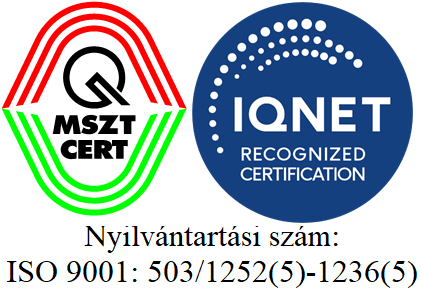News
CNRA Meeting
2007.12.12
The Committee on Nuclear Regulatory Activities of the OECD Nuclear Energy Agency (CNRA) held its second annual meeting on December 3-4 2007 in Paris. Ivan Lux, Deputy Director of the Hungarian Atomic Energy Authority, the Hungarian member of the Committee gave a presentation on the power uprate of the Paks NPP from regulatory point of view and presented a short summary on the events of interest in Hungary.
Regulatory Challanges Related to
Power Uprate - Hungarian Experience
Iván Lux and Jenő Zsoldos
Hungarian Atomic Energy Authority
Nuclear events of interest in Hungary (2007/2)
Nuclear emergency response exercise
2007.11.19
On 14 November 2007 the Paks NPP held its annual nuclear emergency response exercise together with the following public administration organs: - Hungarian Atomic Energy Authority Emergency Response Organization (HAEA ERO), - Governmental Co-ordination Committee Operative Staff, - Governmental Co-ordination Committee Nuclear Emergency Response Working Group, - Governmental Co-ordination Committee Emergency Centre, - Tolna, Bács-Kiskun and Fejér County Defense Committees. The exercise was evaluated by centrally appointed evaluators, moreover it was observed by international observers from the Czech Republic, the European Commission and the USA. Based on the exercise scenario, a simulated emergency situation at the Paks NPP and its radiological consequences were assessed by the participants. The main objectives of the exercise were to test the equipments of and cooperation between the national emergency response organizations. The exercise was declared successful based on the fast-evaluation of the participants. The evaluation report will be completed by the chief evaluator Dr. József Rónaky, director general of HAEA, and it will contain the areas of improvement and the related corrective actions.
Program of the CELEBRATION MEETING held on the occasion of the 50th Anniversary of the International Atomic Energy Agency
2007.05.16
Presented posters Photo album
Photo album 09.00-09.10
Welcome
Mr. József Rónaky, DG HAEA
09.10-09.30
Security – in the context of co-operation between IAEA and Hungary
Ms. Márta Fekszi Horváth, Senior State Secretary
09.30-09.50
Managing Nuclear Energy: past, present and future
Mr. Yuri A. Sokolov DDG NE, IAEA
09.50-10.10 IAEA and Hungary
Mr. György Vajda, former DG HAEA
10.10-10.30 Co-operation with Hungary
Mr. Byung-Koo Kim, Director, TC EU, IAEA
10.30-10.55 Coffee Break
10.55-12.40
The Paks NPP and IAEA
Mr. József Kovács, CEO, Paks NPP
KFKI (Central Research Institute for Physics) links to the IAEA
Mr. János Gadó, Director KFKI AEKI
ATOMKI and IAEA
Mr. Ferenc Tárkányi, SH ATOMKI
National Institute of Oncology and IAEA (ends 12:15)
Mr. Géza Varjas, SH, OOI
Nuclear applications and radiation safety
Wojnárovits László, Director MTA IKI
OSSKI and IAEA
Mr. István Turai, Director, OSSKI
BME NTI links to IAEA: past and future
Mr. Attila Aszódi, Director, BME NTI
12.40-13.00
Summary
Mr. József Rónaky, DG HAEA
13.00- Reception and Poster Session
09.00-09.10
Welcome
Mr. József Rónaky, DG HAEA
09.10-09.30
Security – in the context of co-operation between IAEA and Hungary
Ms. Márta Fekszi Horváth, Senior State Secretary
09.30-09.50
Managing Nuclear Energy: past, present and future
Mr. Yuri A. Sokolov DDG NE, IAEA
09.50-10.10 IAEA and Hungary
Mr. György Vajda, former DG HAEA
10.10-10.30 Co-operation with Hungary
Mr. Byung-Koo Kim, Director, TC EU, IAEA
10.30-10.55 Coffee Break
10.55-12.40
The Paks NPP and IAEA
Mr. József Kovács, CEO, Paks NPP
KFKI (Central Research Institute for Physics) links to the IAEA
Mr. János Gadó, Director KFKI AEKI
ATOMKI and IAEA
Mr. Ferenc Tárkányi, SH ATOMKI
National Institute of Oncology and IAEA (ends 12:15)
Mr. Géza Varjas, SH, OOI
Nuclear applications and radiation safety
Wojnárovits László, Director MTA IKI
OSSKI and IAEA
Mr. István Turai, Director, OSSKI
BME NTI links to IAEA: past and future
Mr. Attila Aszódi, Director, BME NTI
12.40-13.00
Summary
Mr. József Rónaky, DG HAEA
13.00- Reception and Poster Session
Harmonisation of reactor safety
2006.12.04
In 1999 the Western European Nuclear Regulators’ Association (WENRA) established a Reactor Harmonization Working Group (RHWG). Since 2003 Hungary has also been taking part in the work of the group. The RHWG has recently completed the tasks that were formulated in its mandate document: it developed the Reference Levels (Requirements) in 18 different areas of nuclear safety and performed benchmarking with the Reference Levels (RLs) concerning both legally binding regulations and their implementation in all nuclear power plants in the 17 participating countries.
Conference on the future of nuclear power
2006.10.20
An international conference was held on October 19, 2006 at the Corvinus University of Budapest on the “Future of Nuclear Power in Central and Eastern Europe”. The Regional Centre for Energy Policy Research (REKK) organised the conference with the aim to explore the topic of the future role of nuclear power in the Central and Eastern Europe region. The extensive market changes including market liberalization, renewable energy and ETS are all reshaping the energy landscape in the region. Some countries are considering to increase the role of nuclear power in their countries while others are taking steps to start a nuclear program. Consideration was given to infrastructure, investment, market conditions and the safety and risk of nuclear power. Dr. Ivan Lux, Deputy Director General of the Hungarian Atomic Energy Authority gave a presentation on nuclear safety in Hungary. Presentations on the Bulgarian, Romanian and Polish situations gave an overview on the role of nuclear energy in the CEE region. (www.rekk.eu) "Nuclear safety in Hungary"



 ©HAEA - All rights reserved
©HAEA - All rights reserved